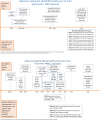Scaling up public mental health care in Sub-Saharan Africa: insights from infectious disease
- PMID: 34868611
- PMCID: PMC8607303
- DOI: 10.1017/gmh.2021.41
Scaling up public mental health care in Sub-Saharan Africa: insights from infectious disease
Abstract
Introduction: Models estimate that the disability burden from mental disorders in Sub-Saharan Africa (SSA) will more than double in the next 40 years. Similar to HIV, mental disorders are stigmatized in many SSA settings and addressing them requires community engagement and long-term treatment. Yet, in contrast to HIV, the public mental healthcare cascade has not been sustained, despite robust data on scalable strategies. We draw on findings from our International AIDS Society (IAS) 2020 virtual workshop and make recommendations for next steps in the scale up of the SSA public mental healthcare continuum.
Discussion: Early HIV surveillance and care cascade targets are discussed as important strategies for HIV response in SSA that should be adopted for mental health. Advocacy, including engagement with civil society, and targeted economic arguments to policymakers, are reviewed in the context of HIV success in SSA. Parallel opportunities for mental disorders are identified. Learning from HIV, communication of strategies that advance mental health care needs in SSA must be prioritized for broad global audiences.
Conclusions: The COVID-19 pandemic is setting off a colossal escalation of global mental health care needs, well-publicized across scientific, media, policymaker, and civil society domains. The pandemic highlights disparities in healthcare access and reinvigorates the push for universal coverage. Learning from HIV strategies, we must seize this historical moment to improve the public mental health care cascade in SSA and capitalize on the powerful alliances ready to be forged. As noted by Ambassador Goosby in our AIDS 2020 workshop, 'The time is now'.
Keywords: HIV; Sub-Saharan Africa; health policy; mental health; treatment cascade.
© The Author(s) 2021.
Conflict of interest statement
None.
Figures
References
-
- Akincigil A and Matthews EB (2017) National rates and patterns of depression screening in primary care: results from 2012 and 2013. Psychiatric Services 68, 660–666. - PubMed
-
- Bolton P, Bass J, Neugebauer R, Verdeli H, Clougherty KF, Wickramaratne P, Speelman L, Ndogoni L and Weissman M (2003) Group interpersonal psychotherapy for depression in rural Uganda: a randomized controlled trial. Journal of the American Medical Association 289, 3117–3124. - PubMed
-
- Booysen FLR (2004) Income and poverty dynamics in HIV/AIDS-affected households in the free state province of South Africa. South African Journal of Economics 72, 522–545.
-
- Byrne L (2017) Lived experience and personal narrative: pathways to connection. Interdisciplinary Journal for the Study of Discourse 38.
Grants and funding
LinkOut - more resources
Full Text Sources
Research Materials

